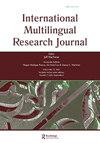Designed for failure: English instruction as a tool for the perpetuation of students’ dependent and dominated status
IF 2.1
1区 文学
Q2 EDUCATION & EDUCATIONAL RESEARCH
引用次数: 3
Abstract
ABSTRACT English, being used predominantly at the official level, in higher education, and in the job market, is the most sought after language in Pakistan. Access to quality instruction in and for English, however, remains a dream for most of the socio-economically disadvantaged students. This study explores the amount, intensity, and quality of access to English instruction in general school systems in Pakistan through a phenomenological multi-case study perspective. Employing symbolic power and sociolinguistics of globalization as theoretical framework, observations of and interviews with the relevant stakeholders were used as instruments of data collection. The data were analyzed using a constructivist grounded theory approach. The findings suggest that the very education system hinders the students studying at general schools from ever achieving the high-level English skills that could accrue cultural, symbolic or economic capital for them. The general schools inculcate in students a habit to be dependent instead of original thinkers and to resolve with the fate of serving at lower social positions, thereby perpetuating their dominated status. The general schools are thus breeding social inequality and stifling the mobility of the underprivileged students. Language education policymakers and practitioners, therefore, need to reform education systems in order to rectify the inequality perpetuated.为失败而设计:英语教学是使学生的依赖和支配地位永久化的工具
英语主要用于官方、高等教育和就业市场,是巴基斯坦最受欢迎的语言。然而,对于大多数处于社会经济劣势的学生来说,获得高质量的英语教学仍然是一个梦想。本研究通过现象学的多案例研究视角探讨了巴基斯坦普通学校系统中英语教学的数量、强度和质量。以全球化的象征权力和社会语言学为理论框架,对相关利益相关者的观察和访谈作为数据收集的工具。数据分析采用建构主义扎根理论的方法。研究结果表明,教育体系本身阻碍了在普通学校学习的学生获得高水平的英语技能,而这些技能可能会为他们积累文化、象征或经济资本。普通学校向学生灌输一种依赖的习惯,而不是原创的思想家,并解决在较低的社会地位服务的命运,从而使他们的统治地位永久化。因此,普通学校助长了社会不平等,抑制了贫困学生的流动性。因此,语言教育的决策者和实践者需要改革教育制度,以纠正这种长期存在的不平等。
本文章由计算机程序翻译,如有差异,请以英文原文为准。
求助全文
约1分钟内获得全文
求助全文
来源期刊
CiteScore
4.10
自引率
4.80%
发文量
19
期刊介绍:
The International Multilingual Research Journal (IMRJ) invites scholarly contributions with strong interdisciplinary perspectives to understand and promote bi/multilingualism, bi/multi-literacy, and linguistic democracy. The journal’s focus is on these topics as related to languages other than English as well as dialectal variations of English. It has three thematic emphases: the intersection of language and culture, the dialectics of the local and global, and comparative models within and across contexts. IMRJ is committed to promoting equity, access, and social justice in education, and to offering accessible research and policy analyses to better inform scholars, educators, students, and policy makers. IMRJ is particularly interested in scholarship grounded in interdisciplinary frameworks that offer insights from linguistics, applied linguistics, education, globalization and immigration studies, cultural psychology, linguistic and psychological anthropology, sociolinguistics, literacy studies, post-colonial studies, critical race theory, and critical theory and pedagogy. It seeks theoretical and empirical scholarship with implications for research, policy, and practice. Submissions of research articles based on quantitative, qualitative, and mixed methods are encouraged. The journal includes book reviews and two occasional sections: Perspectives and Research Notes. Perspectives allows for informed debate and exchanges on current issues and hot topics related to bi/multilingualism, bi/multi-literacy, and linguistic democracy from research, practice, and policy perspectives. Research Notes are shorter submissions that provide updates on major research projects and trends in the field.

 求助内容:
求助内容: 应助结果提醒方式:
应助结果提醒方式:


